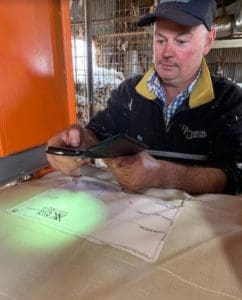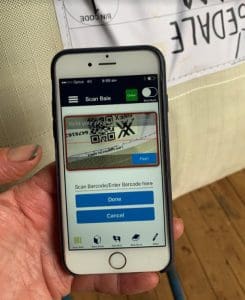

NSW wool classer Doug Mortimer scans an eBale QR code into WoolClip with his mobile phone.
ON-FARM trials of Australia’s unique wool bale identification system – eBale — have been expanded to include the eastern states following grower interest in wool clip traceability.
The Australian Wool Exchange last week said it had started its on-farm eBale or unique bale identification trials on a property in New South Wales and on another in Victoria.
AWEX chief executive officer Mark Grave said initially the eBale trial was to focus on Western Australia, but there has been strong enquiry from stakeholders in the eastern states. After the system is trialled on the 100-bale NSW and Victorian properties, the WA phase will begin.
“I think the interest is coming from growers who want to be progressive and leading and finding out what it can do for them.
“I think it’s all about the issues of traceability and provenance,” he said.
“The opportunity to have a closer relationship with their customer is part of the attraction, absolutely, and some of the things that technology can do is create greater efficiency and productivity.”
Mr Grave said a bale tag’s unique ID number will link via the WoolClip software to the property’s identification code (PIC) and the description of the wool, including its National Wool Declaration status.
 The eBale trials will involve up to 10,000 tags containing a combination RFID/QR Code. The tags will be applied and captured on farm at the time of shearing. The trial will include a range of climates, wool types and clip sizes.
The eBale trials will involve up to 10,000 tags containing a combination RFID/QR Code. The tags will be applied and captured on farm at the time of shearing. The trial will include a range of climates, wool types and clip sizes.
Each wool pack in the trials will have a unique identifier (eBale-ID) stored on a combination radio-frequency identification (RFID) and quick response (QR) code tag placed on the bale label. The unique bale-ID is captured and added to the bale details, via the WoolClip app when adding bales to the wool book. The unique Bale-ID will be read at various stages in the supply chain.
AWEX staff will be on hand at the start of shearing to provide training to shed staff including the classer, presser, contractor and grower on how to how to successfully participate in the eBale trial.
AWEX’s WoolClip support services will be available to follow up with participants as each clip progresses through the system. At the trial’s conclusion, an independent cost benefit analysis will be completed.
Strong interest from wool growers and processors

AWEX CEO Mark Grave
Mr Grave said there has been strong recent interest from eastern states and Western Australian growers to participate in the trials.
“And more importantly real interest from processors overseas.”
Processors and brokers are interested the eBale system for logistical reason to minimise wrong deliveries, ensure warehouse systems are automated and efficient, he said.
Mr Grave said the purpose of the eBale trial is to test, track and assess the progress of each uniquely identified bale of wool through the supply chain.
“Traceability, provenance and product integrity are major drivers in Australian agriculture today along with increased efficiencies in logistics,” he said.
“In this first phase, we will carefully monitor the performance of the eBale tag, how it is used and its potential application at each location.”
Mr Grave said the QR code has been chosen for on-farm application, as it could be easily read by a smartphone using the AWEX WoolClip app.
“This means that there is no requirement to have additional technology/hardware on farm,” he said.
“The RFID is best used in higher volume environments (warehouses, carriers, dumps etc) where fixed and mobile scanners would be utilised.”
Each unique bale-ID is linked to the contents of each bale of wool and captured (on farm) using AWEX’s WoolClip app. The data is released to the marketing organisation (broker) when the classer’s specification is complete.
If growers, brokers, buyers and/or processors are interested in participating in the trial they contact their broker or AWEX direct on 02 9428 6100, he said.

HAVE YOUR SAY